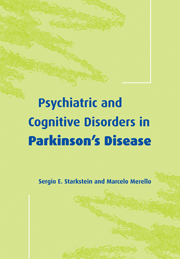Book contents
- Frontmatter
- Contents
- Preface
- 1 Introduction
- 2 Epidemiologic, clinical, and therapeutic aspects of Parkinson's disease
- 3 Parkinsonism and Parkinson's disease
- 4 Cognitive deficits in Parkinson's disease
- 5 Depression in Parkinson's disease
- 6 Anxiety, phobias, apathy, and premorbid personality in Parkinson's disease
- 7 Neuropsychologic and psychiatric side-effects of antiparkinsonian medication
- 8 Treatment of psychiatric disorders in Parkinson's disease
- Appendix
- References
- Index
4 - Cognitive deficits in Parkinson's disease
Published online by Cambridge University Press: 13 August 2009
- Frontmatter
- Contents
- Preface
- 1 Introduction
- 2 Epidemiologic, clinical, and therapeutic aspects of Parkinson's disease
- 3 Parkinsonism and Parkinson's disease
- 4 Cognitive deficits in Parkinson's disease
- 5 Depression in Parkinson's disease
- 6 Anxiety, phobias, apathy, and premorbid personality in Parkinson's disease
- 7 Neuropsychologic and psychiatric side-effects of antiparkinsonian medication
- 8 Treatment of psychiatric disorders in Parkinson's disease
- Appendix
- References
- Index
Summary
The French neurologist Charcot (1875) was the first to suggest the presence of intellectual deficits in PD, when he noticed that “… psychic faculties are definitely impaired … at a given point, the mind becomes clouded and the memory is lost.” Since then, literally hundreds of studies have been devoted to examining the frequency and type of cognitive deficits in PD.
This chapter will review the prevalence of cognitive deficits and dementia in PD. We will examine the clinical correlates and potential mechanisms of cognitive impairments in PD, and neuropathologic findings in PD patients with dementia. The chapter is divided into two main sections: one devoted to dementia sensu stricto, and another devoted to deficits in specific cognitive domains. This separation does not mean that the above are independent phenomena, but allows a more coherent discussion of these topics.
Dementia in PD
Clinical vignette
J.B. is a 59-year-old lawyer, who came to the neurology clinic complaining of right-side stiffness and intermittent hand tremor. On physical examination he had mild right bradykinesia and cogwheel rigidity, and mild pill-rolling tremor. He agreed to participate in a research project, which included a comprehensive neuropsychologic evaluation. He showed no cognitive deficits, except for mild deficits on a verbal fluency task. At a follow-up evaluation 5 years later, he showed more severe bradykinesia and rigidity, which were bilateral but more severe on the right side. Tremor had increased, and he could only write with difficulty. He complained about not being as efficient as usual. […]
- Type
- Chapter
- Information
- Publisher: Cambridge University PressPrint publication year: 2002
- 2
- Cited by



